The Right Peptides Each Day Keep the Doctor Away: Turning Broad Nutrition into a Targeted Solution

Imagine preventing the onset of diabetes, Alzheimer's, or cancer through eating the right foods. Rather than wondering if kale eaten today will truly lead to longevity tomorrow, envision a grocery store shelf that told you exactly which ingredients to eat depending on your specific health needs. Food technology start-up Nuritas is hoping to make that scenario a reality. By harnessing solutions that nature has already given us, Nuritas is using machine learning to identify the exact food-derived bioactive peptides that can cure or prevent a particular disease.
Common health advice recommends eating a balanced and nutritious diet. While this is a wonderful suggestion, it is also a blanket statement that doesn’t include the targeted level of specificity we want from our healthcare providers. Now imagine that we knew exactly which foods to reach for depending on the health issue we are seeking to combat. Launched in 2014, the food technology start-up Nuritas uses machine learning to provide consumers with that level of specification when it comes to food. Intertwining artificial intelligence and DNA sequencing, Nuritas has significantly sped up the process of analyzing peptides in food by tenfold, enabling us to identify their impact within the human body and to predict their potential therapeutic applications. [1]
By accelerating traditional discovery methods, Nuritas has introduced both process optimization and product development to the intersection of food and preventative healthcare. Machine learning has differentiated the company’s ability to deliver results quickly and accurately. Advanced algorithms have enabled Nuritas to accomplish years of research in months, saving precious time and millions in R&D costs. [2] Its AI capabilities have allowed computers to complete the work of biochemists and molecular biologists in a fraction of the time and triggered more comprehensive, iterative testing of food-derived bioactive peptides. [3] Once the peptide is unlocked from the source protein, its activity profile is fed back into the AI platform to refine the accuracy of peptide discovery and hone precision through machine learning. [4] Nuritas is building a rich database of molecules and each one holds a therapeutic benefit that can be integrated into a targeted solution. The process optimization gained by machine learning has also spurred the next stage in Nuritas’ journey: product development. Having identified and matched peptides to health issues, Nuritas is patenting those peptides to develop treatments in partnership with healthcare and consumer companies. [2,5] After an optimized discovery process, Nuritas surfaces the presence of peptides in ingredients that can be sold to food, pharmaceutical, and cosmetic companies and then embedded into their products. [3]

In the short-term, Nuritas is focused on bolstering its AI-driven discovery process and venturing deeper into product development through company partnerships. Rather than competing head-on, Nuritas has wisely chosen to team up with industry leaders and marry its machine learning prowess with the research arms of food companies. [6] This route will enhance the breadth and depth of its peptide database, preserve a wider pool of partner options, and position Nuritas to remain embedded in future stages of product development. Some prominent partnerships have been Nestlé and BASF Human Nutrition. In 2018, Nuritas and BASF launched PeptAIde, an anti-inflammatory for sports nutrition designed to improve post-exercise recovery. [1,7] The next focus area for Nuritas is diabetes. Through its predictive algorithms, Nuritas has already discovered two peptides which regulate blood glucose levels, and now it must choose the right partner to codevelop a food product containing this therapeutically beneficial ingredient. [6] In the medium-term, Nuritas aims to take its machine learning beyond discovery and translate its predictive analytics into personalized nutritional information for consumers. [3] Additionally, Nuritas envisions it will have the future ability to look at an individual’s genome and deliver a recommendation of which peptides that person should eat to increase his or her lifespan. [3] Developing this capability would greatly enhance the company’s repository of data, feed more outputs back into the algorithm to refine its predictive power, and improve the speed and accuracy of Nuritas’ AI-driven discovery process.
Nuritas has used machine learning to build its competitive advantage and secured patents to protect its discoveries. While it has predominantly focused on adding ingredients containing beneficial peptides to food products, there is a chance that the company will begin to think about how to bring its process optimization to genetically modified crops. [3] Although this would likely be a more medium-term move, Nuritas must consider its end-consumer and how it wants to position itself. Defining its mission and its vision in the short-term will be essential to explore new unmet medical needs in the medium-term. Therefore, I would recommend that Nuritas avoid wading into the controversial territory of GMOs and continue promoting its use of natural sources. In the short-term, Nuritas also needs to grow its business by hiring more people and expanding laboratory space. [8] In the medium-term, I would recommend that Nuritas expand its partnership outside of food companies to bring in innovative ideas from players in the cosmetics and pharmaceutical industries.
In conclusion, Nuritas has the potential to transform the “functional food” space. However, outstanding questions remain: How will partners respond to Nuritas working with many of their competitors and will some partners try to secure an exclusive arrangement? How will regulatory classification impact the extent of clinical trials needed for a product that is both a food and therapeutic?
(Word count: 800)
————————
Sources
[1] Prnewswire.com (2017). Nuritas Raises US$20 Million in Series A Funding Using Artificial Intelligence To Unlock Bioactive Peptides To Address Societal Issues. https://www.prnewswire.com/news-releases/nuritas-raises-us20-million-in-series-a-funding-using-artificial-intelligence-to-unlock-bioactive-peptides-to-address-societal-issues-300573839.html [Accessed 12 Nov. 2018].
[2] Nuritas Company website (2018). https://www.nuritas.com/platform/ [Accessed 12 Nov. 2018].
[3] Burwood-Taylor, Louisa (2015). Irish A.I. Startup Nuritas Raises $3.4m Seed Round to Expand Database. AgFunderNews. https://agfundernews.com/irish-artificial-intelligence-startup-nuritas-raises-3-4m-series-a4916.html/ [Accessed 12 Nov. 2018].
[4] Irish Advantage.com (2018). How Nuritas uses AI and food to find new ways to treat and prevent disease. https://irishadvantage.com/success-stories/nuritas-ai-food-treat-prevent-disease/ [Accessed 12 Nov. 2018].
[5] de Jesus, Ayn (2018). Artificial Intelligence in the Pharmaceutical Industry – An Overview of Innovations. TechEmergence. https://www.techemergence.com/artificial-intelligence-for-pharmacies-an-overview-of-innovations/ [Accessed 12 Nov. 2018].
[6] Rowland, Michael Pellman (2017). Machine Learning Is Unlocking Food’s Super Powers. Forbes. https://www.forbes.com/sites/michaelpellmanrowland/2017/02/16/machine-learning-food-technology-health/#2c2a5afb5e14 [Accessed 12 Nov. 2018].
[7] Kennedy, John (2018). Breakthrough as Nuritas Reveals Bioactive Ingredient Delivered through AI. SiliconRepublic. https://www.siliconrepublic.com/innovation/nuritas-basf-ai-peptides-breakthrough-bioactive-ingredient [Accessed 12 Nov. 2018].
[8] Woods, Killian (2018). What Nuritas Is Cooking Up in its New Dublin Lab next to the Lord Mayor’s House. TheJournal.ie. https://www.thejournal.ie/nuritas-new-office-2-3841201-Feb2018/ [Accessed 12 Nov. 2018].




Great post! Being myself very health-conscious in terms of nutrition, it is great to see that advances in this area will lead to more tailored and efficient diets! I completely agree that it is of huge importance for Nuritas to state its mission, as it should be a north for their growth. If Nuritas’ goal is to provide better nutrition in large scale, it can make complete sense to partner with well established organizations in order to leverage their structure (R&D, marketing & sales, distribution, …). To your question, I believe that a pharmaceutical company would indeed require Nuritas to be their exclusive partner due to the importance and confidentiality of R&D and commercial strategies for a given product containing peptides.
Very interesting read! Their potential strategy on delivering recommendations based on people’s genomes has a huge potential for savings since it would add to the field of “preventive medicine”, reducing the probabilities that a person needs treatment for their ailments and thus decrease their spending on healthcare. I think Nuritas could benefit from talking to non-profits focused on preventive medicine, or partnering with governments that are all very interesting in reducing their healthcare spending, specially in an aging society.
Great article, thank you for sharing your views on such an innovative company.
My main concerns are around representation of the benefits to consumers and whether this should be a “medicalized” product or part of everyday healthy eating. I fear that those with early signs of various diseases e.g. cancer would seek Nuritas as a cure rather than a tool for prevention. In the same vein, efficacy and time to see results may differ widely amongst different people, so I have concerns around consumer reactions.
In addition, Nuritas needs to weigh the benefits of partnering up to gain richer data with the costs of being beholden to these partners – I would be interested in understanding how Nuritas and their partners co-create products and the nature of their agreements.
Overall, I believe that this is a very exciting technology and many consumers want to take control of their health in a more personal and “natural” way.